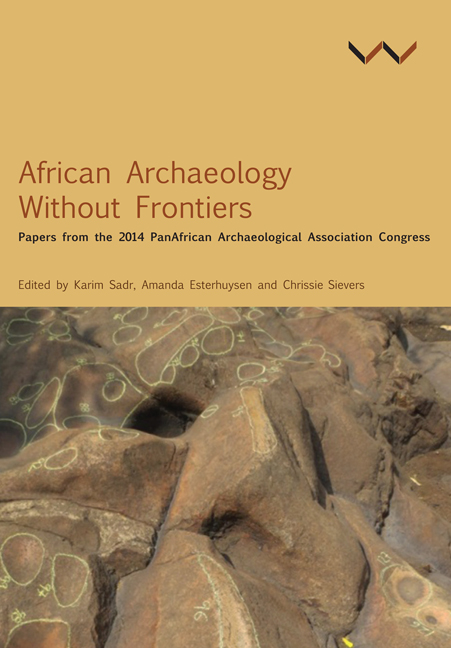 African Archaeology Without Frontiers
African Archaeology Without Frontiers Book contents
- Frontmatter
- Contents
- Acknowledgements
- List of Figures and Tables
- Introduction: An Invitation Fulfilled
- Keynote Address 1: Imagining an African Archaeology Without Frontiers
- Keynote Address 2: A Continental Vision for African Archaeology
- 1 The ‘Useable’ Archaeology of African Farming Systems
- 2 Defining Cultural Heritage among the Makonde of Tanzania
- 3 The Indigenous Roots of Swahili Culture in Pangani Bay, Tanzania
- 4 Is This an Anvil? Iron Bloom Crushing Sites in Northern Togo
- 5 L'art Rupestre au Cameroun, Nouvelles Découvertes et Contribution à L'iconographie Sous-Régionale
- 6 Archaeology and History in Iron Age Settlements in the Congo Basin
- 7 Learning from Glass Trade Beads at Thabadimasego, Botswana
- 8 Blurring Boundaries: Forager–Farmer Interactions in the Middle Limpopo Valley
- 9 Heritage Management and the World Wide Web: South African Challenges
- Contributors
- Index
9 - Heritage Management and the World Wide Web: South African Challenges
Published online by Cambridge University Press: 15 March 2018
- Frontmatter
- Contents
- Acknowledgements
- List of Figures and Tables
- Introduction: An Invitation Fulfilled
- Keynote Address 1: Imagining an African Archaeology Without Frontiers
- Keynote Address 2: A Continental Vision for African Archaeology
- 1 The ‘Useable’ Archaeology of African Farming Systems
- 2 Defining Cultural Heritage among the Makonde of Tanzania
- 3 The Indigenous Roots of Swahili Culture in Pangani Bay, Tanzania
- 4 Is This an Anvil? Iron Bloom Crushing Sites in Northern Togo
- 5 L'art Rupestre au Cameroun, Nouvelles Découvertes et Contribution à L'iconographie Sous-Régionale
- 6 Archaeology and History in Iron Age Settlements in the Congo Basin
- 7 Learning from Glass Trade Beads at Thabadimasego, Botswana
- 8 Blurring Boundaries: Forager–Farmer Interactions in the Middle Limpopo Valley
- 9 Heritage Management and the World Wide Web: South African Challenges
- Contributors
- Index
Summary
Abstract
This paper will discuss the systemic problems of heritage management in South Africa that have been highlighted by the fractured uptake of the South African Heritage Resources Information System (Sahris), and propose potential solutions to the challenges encountered since the promulgation of the National Heritage Resources Act 25 of 1999. Sahris has three primary functions encompassing, 1) a repository of national heritage sites, 2) a national collections management system, and 3) the integration of heritage management functions such as permit and development applications. This paper will focus predominantly on data and lessons learned from implementing Sahris as a tool for integrated heritage resource management. The first version of Sahris went live to the South African public in August 2012, allowing the South African Heritage Resources Agency (Sahra) to phase out paper-based and emailed submissions for applications in March 2013. Amafa/Heritage KwaZulu-Natal followed suit in April 2013. This has led to an improvement in the efficiency and responsiveness of these authorities and has provided a transparent mechanism for applicants and stakeholders to track heritage-related applications and official responses online. Despite the measurable gains made by Sahra and Amafa, the uptake of Sahris has been variable in other provinces in South Africa. The issues faced by each province will be summarised in this paper based on usage statistics generated on Sahris, interviews with key stakeholders, and experiences learned from rolling out the system nationwide over the last two years. A range of potential solutions to the current challenges will be proposed with the objective of steering and contributing towards better policy formulation and governance in this sphere over the next five years.
Legislation:
Section 33 of the KwaZulu-Natal Heritage Act (KZNHA) providing general protection to structures older than 60 years;
Section 8 of the National Heritage Resources Act (NHRA) defining the responsibilities and competence of heritage resources authorities and local authorities for the identification and management of heritage resources;
Section 14 of the NHRA providing for the establishment and constitution of the Sahra Council;
Section 34 of the NHRA providing general protection to structures older than 60 years;
Section 38 of the NHRA legislating management of heritage resources at possible risk from development.
- Type
- Chapter
- Information
- African Archaeology Without FrontiersPapers from the 2014 PanAfrican Archaeological Association Congress, pp. 165 - 178Publisher: Wits University PressPrint publication year: 2016


